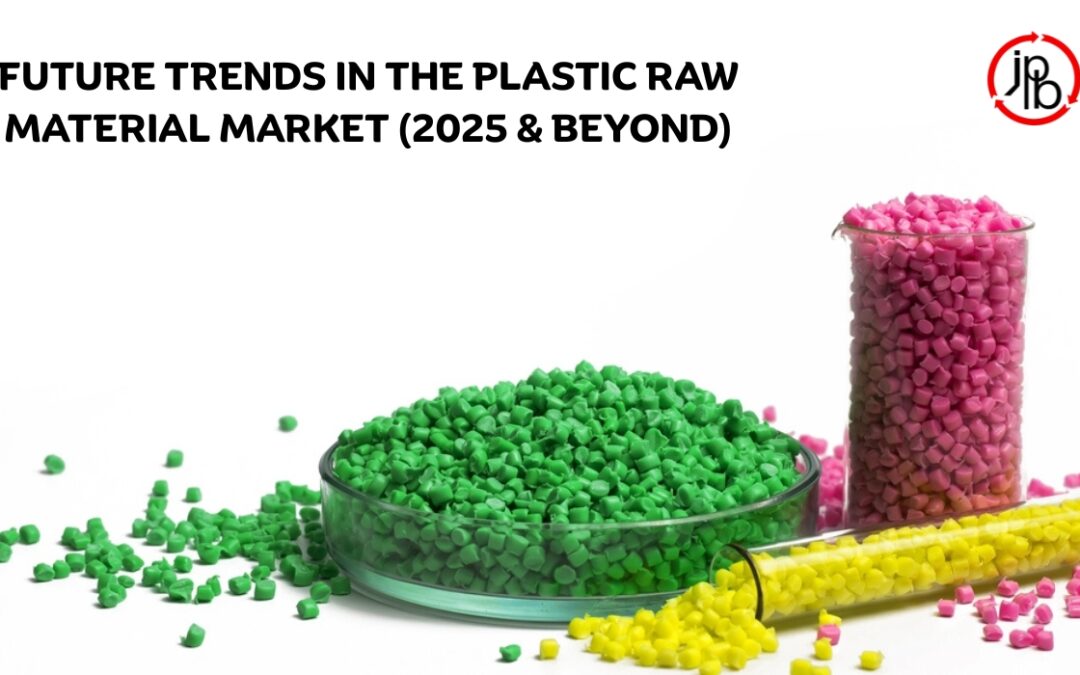The plastic raw material market is undergoing a transformative phase, driven by technological advancements, environmental concerns, and shifting consumer demands. As industries across the globe rely on high-quality plastics for manufacturing, packaging, and product development, the market for raw materials like polymers, resins, and additives is poised for significant growth and innovation. For businesses like Jain Plastic Bhandar, recognized as the best plastic raw material supplier in Delhi and a leading name among the best plastic raw material suppliers in India, staying ahead of these trends is critical to maintaining a competitive edge. This article explores the key trends shaping the future of the plastic raw material market from 2025 and beyond, highlighting opportunities for suppliers, manufacturers, and distributors like Jain Plastic Bhandar, a top polymer distributor in India.
1. Rising Demand for Sustainable and Bio-Based Plastics
One of the most significant trends in the plastic raw material market is the growing emphasis on sustainability. Consumers and governments are increasingly prioritizing eco-friendly materials, leading to a surge in demand for bio-based and biodegradable plastics. These materials, derived from renewable sources like corn, sugarcane, and cellulose, offer a lower environmental footprint compared to traditional petroleum-based plastics.
- Why It Matters: The global push for sustainability is driven by regulations like single-use plastic bans and extended producer responsibility (EPR) policies. In India, the Plastic Waste Management Rules, 2016, and subsequent amendments have accelerated the adoption of sustainable plastics.
- Market Impact: By 2030, the global bio-based plastics market is expected to grow at a CAGR of over 10%, with India emerging as a key market due to its manufacturing capabilities and environmental policies.
- Opportunities for Suppliers: As the best plastic raw material supplier in Delhi, Jain Plastic Bhandar can capitalize on this trend by offering bio-based polymers like polylactic acid (PLA) and polyhydroxyalkanoates (PHA). Expanding their portfolio to include sustainable options will attract environmentally conscious clients in industries like packaging, agriculture, and consumer goods.
2. Advancements in Polymer Recycling Technologies
Recycling is no longer just an environmental necessity; it’s becoming a cornerstone of the plastic raw material market. Innovations in chemical and mechanical recycling technologies are enabling the production of high-quality recycled plastics that rival virgin materials in performance. Advanced recycling methods, such as pyrolysis and depolymerization, are transforming plastic waste into valuable raw materials.
- Why It Matters: Circular economy principles are gaining traction, with companies aiming to reduce waste and improve resource efficiency. In India, where plastic waste management is a growing concern, recycled plastics are becoming a viable alternative for manufacturers.
- Market Impact: The global recycled plastics market is projected to reach USD 70 billion by 2030, with significant contributions from Asia-Pacific. India’s recycling infrastructure is improving, driven by government initiatives and private-sector innovation.
- Opportunities for Suppliers: Jain Plastic Bhandar, as a leading polymer distributor in India, can partner with recycling facilities to supply high-quality recycled polyethylene (PE), polypropylene (PP), and polyethylene terephthalate (PET). By offering recycled materials alongside virgin polymers, they can cater to industries seeking cost-effective and sustainable solutions.
3. Growth of High-Performance Polymers
High-performance polymers, such as polyetheretherketone (PEEK), polyamide-imide (PAI), and polyphenylene sulfide (PPS), are gaining popularity in industries like aerospace, automotive, and electronics. These materials offer superior strength, heat resistance, and durability, making them ideal for demanding applications.
- Why It Matters: The rise of electric vehicles (EVs), 5G technology, and renewable energy systems is driving demand for lightweight, durable, and heat-resistant materials. In India, the automotive and electronics sectors are expanding rapidly, creating a need for specialized polymers.
- Market Impact: The global high-performance plastics market is expected to grow at a CAGR of 7.5% through 2030, with India being a key growth hub due to its manufacturing prowess.
- Opportunities for Suppliers: As the best plastic raw material supplier in India, Jain Plastic Bhandar can expand its inventory to include high-performance polymers, catering to industries requiring advanced materials. Collaborating with global polymer manufacturers to source these materials will enhance their market position.
4. Digitalization and Smart Supply Chains
The plastic raw material market is embracing digital transformation to streamline operations and improve customer experiences. Technologies like artificial intelligence (AI), blockchain, and the Internet of Things (IoT) are revolutionizing supply chain management, enabling real-time tracking, demand forecasting, and inventory optimization.
- Why It Matters: Efficient supply chains reduce costs, improve delivery times, and enhance customer satisfaction. In India, where logistics can be challenging due to infrastructure constraints, digital tools offer a competitive advantage.
- Market Impact: By 2025, over 60% of global supply chains are expected to adopt digital tools, with India leading in AI-driven logistics solutions.
- Opportunities for Suppliers: Jain Plastic Bhandar can leverage digital platforms to offer seamless ordering, real-time inventory updates, and customized solutions for clients. As the best plastic raw material supplier in Delhi, adopting smart supply chain technologies will strengthen their reputation for reliability and efficiency.
5. Shift Toward Lightweight Plastics in Automotive and Aerospace
The automotive and aerospace industries are increasingly adopting lightweight plastics to improve fuel efficiency and reduce emissions. Materials like carbon fiber-reinforced plastics (CFRP) and advanced composites are replacing traditional metals in vehicle and aircraft manufacturing.
- Why It Matters: India’s automotive sector is witnessing a boom in electric vehicle production, with companies like Tata Motors and Mahindra investing heavily in lightweight materials. Similarly, the aerospace sector is growing, driven by initiatives like “Make in India.”
- Market Impact: The global market for lightweight plastics in automotive applications is expected to exceed USD 50 billion by 2030, with India playing a significant role.
- Opportunities for Suppliers: As a trusted polymer distributor in India, Jain Plastic Bhandar can supply lightweight polymers like polycarbonate (PC) and acrylonitrile butadiene styrene (ABS) to automotive and aerospace manufacturers. Offering tailored solutions for these industries will position them as a preferred supplier.
6. Increased Focus on Regulatory Compliance
Stringent regulations on plastic production, usage, and disposal are shaping the market. Governments worldwide are implementing policies to reduce plastic pollution, promote recycling, and encourage sustainable practices. In India, the Extended Producer Responsibility (EPR) framework mandates that manufacturers and suppliers take responsibility for plastic waste management.
- Why It Matters: Non-compliance with regulations can lead to penalties and reputational damage. Suppliers who align with regulatory requirements gain a competitive edge.
- Market Impact: By 2025, over 70% of plastic raw material suppliers globally are expected to adopt compliance-focused strategies, with India being a key market due to its regulatory landscape.
- Opportunities for Suppliers: Jain Plastic Bhandar, as the best plastic raw material supplier in India, can differentiate itself by offering materials that comply with EPR and other regulations. Providing certifications and documentation for eco-friendly and compliant materials will build trust with clients.
7. Expansion of Additive Manufacturing (3D Printing)
Additive manufacturing, or 3D printing, is revolutionizing the plastic raw material market by enabling customized production with minimal waste. Polymers like nylon, PLA, and ABS are widely used in 3D printing for prototyping and end-use products.
- Why It Matters: Industries like healthcare, automotive, and consumer goods are adopting 3D printing for rapid prototyping and small-batch production. In India, the 3D printing market is growing rapidly, supported by government initiatives and startup ecosystems.
- Market Impact: The global 3D printing plastics market is projected to reach USD 3 billion by 2030, with India emerging as a key player.
- Opportunities for Suppliers: Jain Plastic Bhandar can tap into this market by supplying high-quality polymers for 3D printing applications. As the best plastic raw material supplier in Delhi, offering specialized materials for additive manufacturing will attract innovative manufacturers.
8. Growth in Demand for Antimicrobial Plastics
The COVID-19 pandemic highlighted the importance of hygiene, leading to increased demand for antimicrobial plastics in healthcare, packaging, and consumer goods. These plastics incorporate additives that inhibit the growth of bacteria and viruses, making them ideal for high-touch surfaces and medical devices.
- Why It Matters: With health and safety remaining a priority, antimicrobial plastics are becoming a standard in industries like healthcare and food packaging.
- Market Impact: The global antimicrobial plastics market is expected to grow at a CAGR of 7% through 2030, with significant demand in Asia-Pacific.
- Opportunities for Suppliers: As a leading polymer distributor in India, Jain Plastic Bhandar can supply antimicrobial additives and compounds to meet this demand. Partnering with manufacturers to develop customized antimicrobial plastics will enhance their market presence.
9. Regional Market Dynamics in India
India is a key player in the global plastic raw material market, driven by its manufacturing capabilities, growing population, and increasing industrialization. Delhi, as a major commercial hub, is a critical market for plastic raw material suppliers.
- Why It Matters: Delhi’s proximity to industrial clusters in North India makes it a strategic location for suppliers. The city’s demand for plastics spans packaging, construction, automotive, and consumer goods.
- Market Impact: India’s plastic raw material market is expected to grow at a CAGR of 6.5% through 2030, with Delhi being a major contributor.
- Opportunities for Suppliers: Jain Plastic Bhandar, recognized as the best plastic raw material supplier in Delhi, can strengthen its position by offering a diverse range of polymers, additives, and recycled materials. Expanding their distribution network across India will solidify their status as the best plastic raw material supplier in India.
10. Collaboration and Innovation in the Supply Chain
Collaboration between suppliers, manufacturers, and research institutions is driving innovation in the plastic raw material market. Partnerships are enabling the development of new materials, recycling technologies, and sustainable practices.
- Why It Matters: Collaborative efforts reduce costs, improve product quality, and accelerate innovation. In India, public-private partnerships are fostering advancements in plastic manufacturing and recycling.
- Market Impact: By 2030, collaborative models are expected to account for 30% of innovations in the plastic raw material market.
- Opportunities for Suppliers: Jain Plastic Bhandar can collaborate with polymer manufacturers, recycling firms, and research institutions to develop cutting-edge materials. As a leading polymer distributor in India, such partnerships will enhance their ability to offer innovative solutions.
Conclusion
The plastic raw material market is at a pivotal moment, with sustainability, technology, and regulatory compliance shaping its future. For suppliers like Jain Plastic Bhandar, recognized as the best plastic raw material supplier in Delhi and a top polymer distributor in India, these trends present both challenges and opportunities. By embracing sustainable materials, leveraging digital technologies, and expanding their product portfolio, they can solidify their position as the best plastic raw material supplier in India. Staying ahead of these trends will ensure they meet the evolving needs of manufacturers and contribute to a more sustainable and innovative future for the plastic industry.

